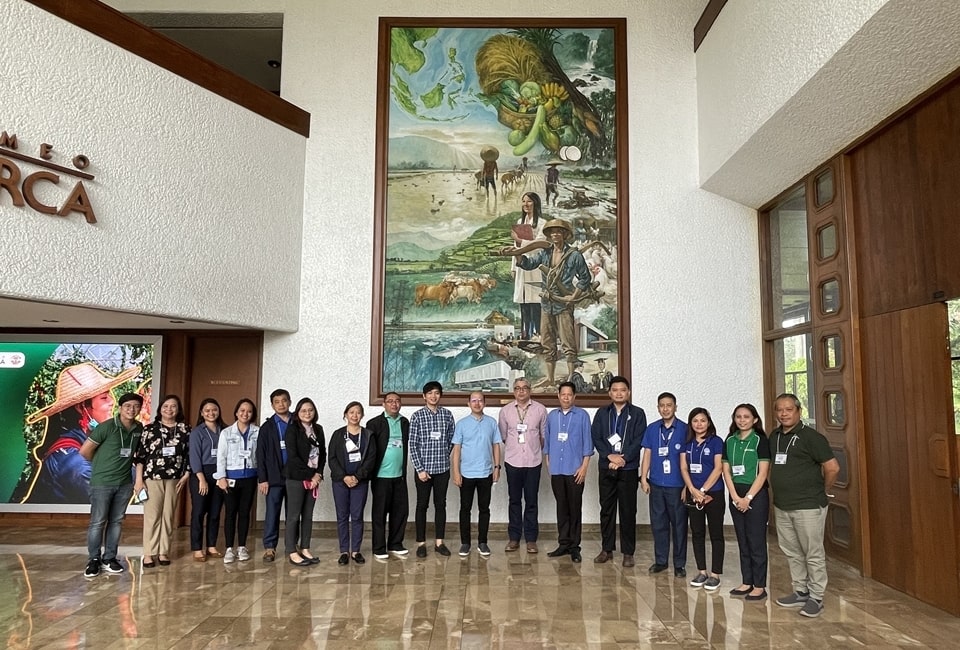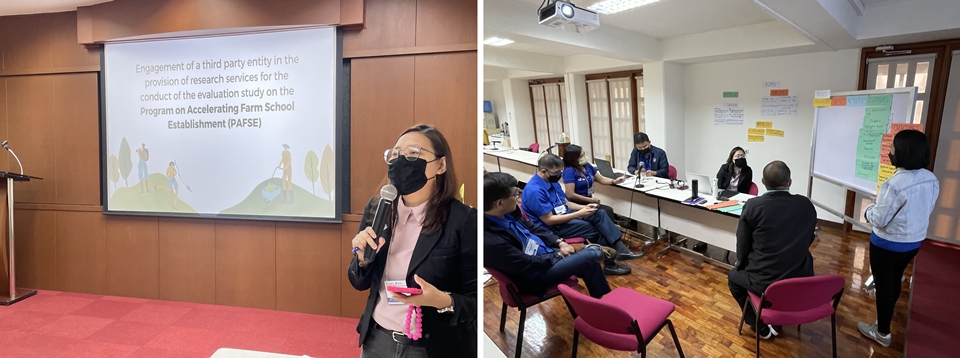 Members of the TESDA-PAFSE Project team together with the representatives from TESDA Central Office, DA-ATI, and DAR during the conduct of the workshop on 13 September 2022
Members of the TESDA-PAFSE Project team together with the representatives from TESDA Central Office, DA-ATI, and DAR during the conduct of the workshop on 13 September 2022
The Southeast Asian Regional Center for Graduate Study and Research in Agriculture (SEARCA) was commissioned by the Technical Education and Skills Development Authority (TESDA) to conduct the evaluation of the Program on Accelerating Farm School Establishment (PAFSE). PAFSE is one of the programs of TESDA being implemented nationwide which aims to encourage farmers and other private individual to set up farm schools across the country. The program is one of the TESDA’s efforts to give top priority to the provisions of skills training, retooling, reskilling, and upgrading of the labor force, specifically those in the agri-fishery sector. TESDA implements the program in close coordination with the Department of Agriculture-Agriculture Training Institute (DA-ATI) and the Department of Agrarian Reform (DAR). Since 2016, the program was able to support the establishment and improvement of more than 111 farm schools nationwide with 275 agri-fishery focused registered training programs and courses.
The evaluation study being carried out by SEARCA aims to understand the existing implementation process, identify the challenges, operational issues, as well as the best practices and learnings to draw lessons and recommendations for the improvement of PAFSE. Part of the evaluation study is to develop the Theory of Change (ToC) Framework for the PAFSE to serve as the basis for the operational assessment. The workshop for ToC development conducted on 13 September 2022 at SEARCA was participated in by the PAFSE Technical Working Group (TWG) composed of representatives from TESDA Central Office, DA-ATI, and DAR.
In addition, participants were re-orientated on the intended impacts and long-term outcomes of the PAFSE program. Asst. Prof. Paul Joseph Ramirez, Project Leader, presented the project overview and workshop mechanics. He also shared the ToC formulation process through the assistance of Dr. Rodmyr Datoon, Assistant Project Leader. In the afternoon, the participants were divided into two groups to map out their respective program activities, inputs, and outputs in relation to the farm school establishment. Results of the breakout session were presented during the plenary session wherein they mutually defined the suitable key performance indicators for each output/outcome statement identified. The results of the workshop will be used in the development of the questionnaires and guide questions for the upcoming data collection activities.
 Left: Ms. Zarsadias, giving the overview of PAFSE project. Right: TESDA group during the breakout session in identifying the key activities, inputs, output and outcome of the PAFSE.
Left: Ms. Zarsadias, giving the overview of PAFSE project. Right: TESDA group during the breakout session in identifying the key activities, inputs, output and outcome of the PAFSE.
Ms. Katherine Amor A. Zarsadias, Chief of the Policy, Research and Evaluation Division of TESDA, expressed her gratitude to the project team for giving them the opportunity to also be involved in the research. With the conduct of the workshop, she said they had a better understanding of the alignment and synergy needed to improve the implementation of the program. She also conveyed her expectation that the project team will further gain intuitive findings when the team conducts the key informant interviews TESDA Regional Offices and selected farm schools of the study. The study team is set to start the data collection activities in October 2022 covering six regions across the country.